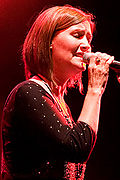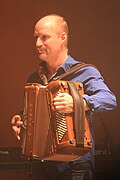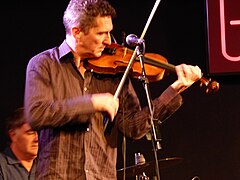Capercaillie (band): Difference between revisions
Poolietrev (talk | contribs) mNo edit summary |
Filled in 2 bare reference(s) with reFill 2 |
||
| Line 22: | Line 22: | ||
==Origins== |
==Origins== |
||
Originating from [[Argyll]], a region of western [[Scotland]], the band is named after the [[Western capercaillie]], sometimes called a wood grouse, a native Scottish bird.<ref>{{cite web|url=http://georgegraham.com/reviews/capercal.html|title=Capercaille:Roses and Tears: by George Graham|publisher= |
Originating from [[Argyll]], a region of western [[Scotland]], the band is named after the [[Western capercaillie]], sometimes called a wood grouse, a native Scottish bird.<ref>{{cite web|url=http://georgegraham.com/reviews/capercal.html|title=Capercaille:Roses and Tears: by George Graham|publisher=Georgegraham.com|access-date=9 January 2011}}</ref> |
||
==Career== |
==Career== |
||
Their first album, ''Cascade'', was recorded in 1984.<ref name="Larkin"/> The band gave their last known (free) performance on 17 August 2019 at the Festival des Filets Bleus in [[Concarneau]], [[Brittany]], [[France]]<ref> |
Their first album, ''Cascade'', was recorded in 1984.<ref name="Larkin"/> The band gave their last known (free) performance on 17 August 2019 at the Festival des Filets Bleus in [[Concarneau]], [[Brittany]], [[France]]<ref>{{Cite web|url=http://www.lennproduction.fr/actu/capercaillie-en-concert-exceptionnel-a-concarneau-en-2019/|title=Capercaillie en concert exceptionnel à Concarneau en 2019 !|website=Lennproduction.fr|date=11 February 2019|access-date=18 August 2021}}</ref><ref>{{Cite web|url=https://www.setlist.fm/setlist/capercaillie/2019/quai-carnot-concarneau-france-438ea3d3.html|title=Capercaillie Setlist at Festival des Filets Bleus 2019|website=Setlist.fm|access-date=18 August 2021}}</ref> until they performed for the first in 2 years on 6 August 2021 at the [[Wickham Festival]] in [[Wickham, Hampshire|Wickham]], [[Hampshire]], [[England]]. |
||
==Musical style== |
==Musical style== |
||
Capercaillie's repertoire includes both traditional Gaelic songs and tunes, as well as modern English-language songs and tunes, composed by other folk writers and musicians, or by members of the band. The group often adapt traditional Gaelic songs and music using modern production techniques, and often mix musical forms,<ref>{{cite web|url=http://worldmusic.nationalgeographic.com/view/page.basic/artist/content.artist/capercaillie_20592/en_US |title=Capercaille |work=National Geographic | |
Capercaillie's repertoire includes both traditional Gaelic songs and tunes, as well as modern English-language songs and tunes, composed by other folk writers and musicians, or by members of the band. The group often adapt traditional Gaelic songs and music using modern production techniques, and often mix musical forms,<ref>{{cite web|url=http://worldmusic.nationalgeographic.com/view/page.basic/artist/content.artist/capercaillie_20592/en_US |title=Capercaille |work=National Geographic |access-date=9 January 2011 |url-status=dead |archiveurl=https://web.archive.org/web/20110103170818/http://worldmusic.nationalgeographic.com/view/page.basic/artist/content.artist/capercaillie_20592/en_US |archive-date=3 January 2011 }}</ref> combining traditional lyrics and tunes with modern techniques and instruments such as synthesisers, drum machines, electric guitar and bass. |
||
Capercaillie's first two albums, ''Cascade'' and ''[[Crosswinds (Capercaillie album)|Crosswinds]]'' featured few modern instruments and the tunes and songs were played in a more traditional arrangement.<ref name="Larkin"/> However beginning with later albums such as ''[[Sidewaulk]]'', and the soundtrack of ''[[The Blood Is Strong]]'', Capercaillie began to experiment with adding [[funk]] bass-lines into certain tracks, as well as synthesisers and electric guitar.<ref name="Larkin"/> This fusion style gained Capercaillie chart success in the 1990s, on albums such as ''[[Delirium (Capercaillie album)|Delirium]]'' and ''[[Secret People (album)|Secret People]]'' (see [[#Chart Success|Chart Success]], below) and reached its peak in the albums ''To the Moon'' and ''[[Beautiful Wasteland (album)|Beautiful Wasteland]]'', with the remix albums ''[[Get Out (album)|Get Out]]'' and ''Capercaillie'' being released during this period. |
Capercaillie's first two albums, ''Cascade'' and ''[[Crosswinds (Capercaillie album)|Crosswinds]]'' featured few modern instruments and the tunes and songs were played in a more traditional arrangement.<ref name="Larkin"/> However beginning with later albums such as ''[[Sidewaulk]]'', and the soundtrack of ''[[The Blood Is Strong]]'', Capercaillie began to experiment with adding [[funk]] bass-lines into certain tracks, as well as synthesisers and electric guitar.<ref name="Larkin"/> This fusion style gained Capercaillie chart success in the 1990s, on albums such as ''[[Delirium (Capercaillie album)|Delirium]]'' and ''[[Secret People (album)|Secret People]]'' (see [[#Chart Success|Chart Success]], below) and reached its peak in the albums ''To the Moon'' and ''[[Beautiful Wasteland (album)|Beautiful Wasteland]]'', with the remix albums ''[[Get Out (album)|Get Out]]'' and ''Capercaillie'' being released during this period. |
||
| Line 37: | Line 37: | ||
==Chart success== |
==Chart success== |
||
Their 1992 [[Extended play|EP]], ''A Prince Among Islands'', was the first [[Scottish Gaelic]]-language record to have a single that reached the Top 40 of the [[UK Singles Chart]]: "Coisich A Ruin" peaked at No. 39.<ref>{{cite book|url=https://books.google.com/books?id=gZIjT8PgJMEC&q=prince+among+islands+top+uk+top+40&pg=PA315|title=International who's who in popular music |
Their 1992 [[Extended play|EP]], ''A Prince Among Islands'', was the first [[Scottish Gaelic]]-language record to have a single that reached the Top 40 of the [[UK Singles Chart]]: "Coisich A Ruin" peaked at No. 39.<ref>{{cite book|url=https://books.google.com/books?id=gZIjT8PgJMEC&q=prince+among+islands+top+uk+top+40&pg=PA315|title=International who's who in popular music|publisher=Europa Publications Limited|year=2002|isbn=9781857431612|access-date=9 January 2011}}</ref> Another single, "Dark Alan ([[Ailein duinn]])" reached No. 65 in the UK Singles Chart in June 1995.<ref name="British Hit Singles & Albums">{{cite book |
||
| first= David |
| first= David |
||
| last= Roberts |
| last= Roberts |
||
Revision as of 23:03, 18 August 2021
Capercaillie | |
|---|---|
 Capercaillie at Nuremberg, 2005 | |
| Background information | |
| Origin | Oban, Scotland |
| Genres | Scottish folk music, traditional Gaelic music |
| Years active | 1984–present |
| Labels | Survival, Vertical, Valley Entertainment |
| Members | Karen Matheson Charlie McKerron Michael McGoldrick Manus Lunny Donald Shaw Ewen Vernal Che Beresford David Robertson |
| Past members | Joan McLachlan Anton Kirkpatrick Shaun Craig Martin Macleod Marc Duff John Saich Wilf Taylor James Mackintosh |
| Website | capercaillie |
Capercaillie is a Scottish folk band that was founded in 1984 by Donald Shaw and led by Karen Matheson. Capercaillie performs traditional Gaelic and contemporary English songs.[1] The group adapts traditional Gaelic music and traditional lyrics with modern production techniques and instruments such as electric guitar and bass guitar, though rarely synthesizers or drum machines.
The group's albums have appeared in the UK Albums Chart.[2]
Origins
Originating from Argyll, a region of western Scotland, the band is named after the Western capercaillie, sometimes called a wood grouse, a native Scottish bird.[3]
Career
Their first album, Cascade, was recorded in 1984.[1] The band gave their last known (free) performance on 17 August 2019 at the Festival des Filets Bleus in Concarneau, Brittany, France[4][5] until they performed for the first in 2 years on 6 August 2021 at the Wickham Festival in Wickham, Hampshire, England.
Musical style
Capercaillie's repertoire includes both traditional Gaelic songs and tunes, as well as modern English-language songs and tunes, composed by other folk writers and musicians, or by members of the band. The group often adapt traditional Gaelic songs and music using modern production techniques, and often mix musical forms,[6] combining traditional lyrics and tunes with modern techniques and instruments such as synthesisers, drum machines, electric guitar and bass.
Capercaillie's first two albums, Cascade and Crosswinds featured few modern instruments and the tunes and songs were played in a more traditional arrangement.[1] However beginning with later albums such as Sidewaulk, and the soundtrack of The Blood Is Strong, Capercaillie began to experiment with adding funk bass-lines into certain tracks, as well as synthesisers and electric guitar.[1] This fusion style gained Capercaillie chart success in the 1990s, on albums such as Delirium and Secret People (see Chart Success, below) and reached its peak in the albums To the Moon and Beautiful Wasteland, with the remix albums Get Out and Capercaillie being released during this period.
Capercaillie have drawn back slightly from the heavy fusion style featured on their albums the 1990s, and their more recent albums from Nàdurra (2003) up to At the Heart of It All (2013) feature more traditional arrangements and instruments, while still retaining a slight fusion feel.
The opening track from their 2000 album Nàdurra, "Skye Waulking Song", was used in the Edexcel Music GCSE Specification from 2009 to 2016.[7] The song was in the world music section, and was used as a representation of traditional folk music combined with rock music.
Chart success
Their 1992 EP, A Prince Among Islands, was the first Scottish Gaelic-language record to have a single that reached the Top 40 of the UK Singles Chart: "Coisich A Ruin" peaked at No. 39.[8] Another single, "Dark Alan (Ailein duinn)" reached No. 65 in the UK Singles Chart in June 1995.[2]
The album Secret People (1993) reached No. 40, and To the Moon (1995) peaked at No. 41 in the UK Albums Chart.[2]
Discography
Studio albums
- Cascade (1984)
- Crosswinds (1987)
- Sidewaulk (1989)
- Delirium (1991)
- Secret People (1993)
- To the Moon (1995)
- Beautiful Wasteland (1997)
- Nàdurra (2000)
- Choice Language (2003)
- Roses and Tears (2008)
- At the Heart of It All (2013)
Live albums
- Live in Concert (2002)
Soundtrack albums
- The Blood Is Strong (1988)
- Glenfinnan (Songs of the '45) (1998, recorded in 1995)
Remix albums
- Get Out (1992) (a compilation album of B-sides, remixes & unreleased studio and live tracks)
- Capercaillie (1994) (a compilation album of re-worked and remixed tracks)
Compilation albums
- Dusk till Dawn: The Best of Capercaillie (1998)
- Waulk Roots (1998) Tracks from early albums Crosswinds and Sidewaulk
- Grace and Pride: The Anthology 2004-1984 (2004)
Band members
Current members
- Karen Matheson – vocals (1984 – present)
- Charlie McKerron – fiddle (1986 – present)
- Michael McGoldrick – flute, whistle, uilleann pipes (1997 – present)
- Manus Lunny – bouzouki, guitar (1989 – present)
- Donald Shaw – keyboards, accordion (1984 – present)
- Ewen Vernal – bass (1998 – present)
- David "Chimp" Robertson – percussion (1997 – present)
- Che Beresford – drums (1998 – present)
- James Mackintosh – drums (1992 – 1993, 2000, 2013)
-
Karen Matheson
-
Donald Shaw
-
Charlie McKerron
-
Manus Lunny
-
Ewen Vernal
-
Michael McGoldrick
-
David Robertson
-
Che Beresford
Former members
- Marc Duff – whistle, recorder, wind synthesizer, bodhrán (1984–1995)
- Fred Morrison – Highland small pipes and low whistle (1995–1997)
- John Saich – bass, guitar (1988–1998)
- Shaun Craig – guitar, bouzouki (1984–1988)
- Anton Kirkpatrick – guitar (1988–1989)
- Martin MacLeod – bass, fiddle (1984–1988)
- Joan Maclachlan – fiddle, vocals (1984–1986)
Timeline

References
- ^ a b c d Colin Larkin, ed. (1997). The Virgin Encyclopedia of Popular Music (Concise ed.). Virgin Books. p. 221. ISBN 1-85227-745-9.
- ^ a b c Roberts, David (2006). British Hit Singles & Albums (19th ed.). London: Guinness World Records Limited. p. 92. ISBN 1-904994-10-5.
- ^ "Capercaille:Roses and Tears: by George Graham". Georgegraham.com. Retrieved 9 January 2011.
- ^ "Capercaillie en concert exceptionnel à Concarneau en 2019 !". Lennproduction.fr. 11 February 2019. Retrieved 18 August 2021.
- ^ "Capercaillie Setlist at Festival des Filets Bleus 2019". Setlist.fm. Retrieved 18 August 2021.
- ^ "Capercaille". National Geographic. Archived from the original on 3 January 2011. Retrieved 9 January 2011.
- ^ https://web.archive.org/web/20110702003130/http://www.edexcel.com/migrationdocuments/GCSE%20New%20GCSE/GCSE-Music-Spec-issue-2-for-web.pdf
- ^ International who's who in popular music. Europa Publications Limited. 2002. ISBN 9781857431612. Retrieved 9 January 2011.








